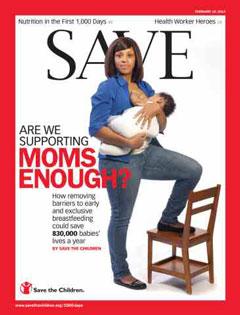In a report released on Monday “Superfood for Babies,” the international humanitarian and development agency identified four significant barriers that prevent more women from successfully breastfeeding, including during the critical “power hour” after birth.
They are: cultural and community pressures, the health worker shortage, lack of maternity legislation, and inappropriate marketing of breast-milk substitutes.
According to the report immediate breastfeeding kickstarts the baby's immune system, making them three times more likely to survive.
Breastfeeding for the first six months also makes babies from developing countries 15 times less likely to die from fatal diseases such as pneumonia and diarrhoea.
Save the Children said global breastfeeding rates were falling in some areas of Africa and east Asia. In Asia the number of breastfeeding mothers fell from 45 per cent in 2006 to 29 per cent in 2012.
Save the Children today also launched its 95 babies campaign to highlight the importance of mothers breastfeeding immediately after giving birth.
Following the Time magazine article last year on how long mums should breastfeed for, Save the Children created their own magazine cover to really shed light on the breastfeeding issues they believe are most critical.
“Last year, we saw a lot of handwringing over how long is too long for mums to breastfeed. But the real scandal is that many mums around the world don't get the support they need to start breastfeeding early – or even at all,” says Carolyn Miles, President & CEO of Save the Children.
“It’s a choice all mums should have, and in the developing world it can literally be a matter of life and death for their babies.”
Celebrities such as Victoria Beckham and Isla Fisher have come out in support of Save the Children’s campaign.








 Agree (0)
Agree (0) Disagree (
Disagree (
__small.jpg)








__small.png)










